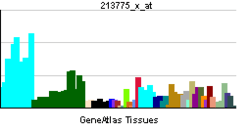ZNF638
| ZNF638 | |||||||||||||||||
|---|---|---|---|---|---|---|---|---|---|---|---|---|---|---|---|---|---|
| Identifiers | |||||||||||||||||
| Aliases | ZNF638, NP220, ZFML, Zfp638, zinc finger protein 638 | ||||||||||||||||
| External IDs | MGI: 1203484 HomoloGene: 7447 GeneCards: ZNF638 | ||||||||||||||||
| |||||||||||||||||
| RNA expression pattern | |||||||||||||||||
  | |||||||||||||||||
| More reference expression data | |||||||||||||||||
| Orthologs | |||||||||||||||||
| Species | Human | Mouse | |||||||||||||||
| Entrez | |||||||||||||||||
| Ensembl | |||||||||||||||||
| UniProt | |||||||||||||||||
| RefSeq (mRNA) | |||||||||||||||||
| RefSeq (protein) | |||||||||||||||||
| Location (UCSC) | Chr 2: 71.28 – 71.44 Mb | Chr 6: 83.87 – 83.99 Mb | |||||||||||||||
| PubMed search | [1] | [2] | |||||||||||||||
| Wikidata | |||||||||||||||||
| View/Edit Human | View/Edit Mouse |
Zinc finger protein 638 is a protein that in humans is encoded by the ZNF638 gene.[3][4]
The protein encoded by this gene is a nucleoplasmic protein. It binds cytidine-rich sequences in double-stranded DNA. This protein has three types of domains: MH1, MH2 (repeated three times) and MH3. It is associated with packaging, transferring, or processing transcripts. Multiple alternatively spliced transcript variants have been found for this gene, but the biological validity of some variants has not been determined.[4]
Interactions
ZNF638 has been shown to interact with FHL2.[5]
References
- ↑ "Human PubMed Reference:".
- ↑ "Mouse PubMed Reference:".
- ↑ Inagaki H, Matsushima Y, Nakamura K, Ohshima M, Kadowaki T, Kitagawa Y (Jul 1996). "A large DNA-binding nuclear protein with RNA recognition motif and serine/arginine-rich domain". J Biol Chem. 271 (21): 12525–31. doi:10.1074/jbc.271.21.12525. PMID 8647861.
- 1 2 "Entrez Gene: ZNF638 zinc finger protein 638".
- ↑ Ng, Enders Kai On; Chan Kwok Keung; Wong Chi Hang; Tsui Stephen Kwok Wing; Ngai Sai Ming; Lee Simon Ming Yuen; Kotaka Masayo; Lee Cheuk Yu; Waye Mary Miu Yee; Fung Kwok Pui (2002). "Interaction of the heart-specific LIM domain protein, FHL2, with DNA-binding nuclear protein, hNP220". J. Cell. Biochem. United States. 84 (3): 556–66. doi:10.1002/jcb.10041. ISSN 0730-2312. PMID 11813260.
Further reading
- Okumara K, Nogami M, Matsushima Y, et al. (1998). "Mapping of human DNA-binding nuclear protein (NP220) to chromosome band 2p13.1-p13.2 and its relation to matrin 3.". Biosci. Biotechnol. Biochem. 62 (8): 1640–2. doi:10.1271/bbb.62.1640. PMID 9757574.
- Eichmuller S, Usener D, Dummer R, et al. (2001). "Serological detection of cutaneous T-cell lymphoma-associated antigens.". Proc. Natl. Acad. Sci. U.S.A. 98 (2): 629–34. doi:10.1073/pnas.021386498. PMC 14639
 . PMID 11149944.
. PMID 11149944. - Ng EK, Chan KK, Wong CH, et al. (2002). "Interaction of the heart-specific LIM domain protein, FHL2, with DNA-binding nuclear protein, hNP220.". J. Cell. Biochem. 84 (3): 556–66. doi:10.1002/jcb.10041. PMID 11813260.
- Strausberg RL, Feingold EA, Grouse LH, et al. (2003). "Generation and initial analysis of more than 15,000 full-length human and mouse cDNA sequences.". Proc. Natl. Acad. Sci. U.S.A. 99 (26): 16899–903. doi:10.1073/pnas.242603899. PMC 139241
 . PMID 12477932.
. PMID 12477932. - Ota T, Suzuki Y, Nishikawa T, et al. (2004). "Complete sequencing and characterization of 21,243 full-length human cDNAs.". Nat. Genet. 36 (1): 40–5. doi:10.1038/ng1285. PMID 14702039.
- Beausoleil SA, Jedrychowski M, Schwartz D, et al. (2004). "Large-scale characterization of HeLa cell nuclear phosphoproteins.". Proc. Natl. Acad. Sci. U.S.A. 101 (33): 12130–5. doi:10.1073/pnas.0404720101. PMC 514446
 . PMID 15302935.
. PMID 15302935. - Gerhard DS, Wagner L, Feingold EA, et al. (2004). "The status, quality, and expansion of the NIH full-length cDNA project: the Mammalian Gene Collection (MGC).". Genome Res. 14 (10B): 2121–7. doi:10.1101/gr.2596504. PMC 528928
 . PMID 15489334.
. PMID 15489334. - Benzinger A, Muster N, Koch HB, et al. (2005). "Targeted proteomic analysis of 14-3-3 sigma, a p53 effector commonly silenced in cancer.". Mol. Cell Proteomics. 4 (6): 785–95. doi:10.1074/mcp.M500021-MCP200. PMID 15778465.
- Hillier LW, Graves TA, Fulton RS, et al. (2005). "Generation and annotation of the DNA sequences of human chromosomes 2 and 4.". Nature. 434 (7034): 724–31. doi:10.1038/nature03466. PMID 15815621.
- Rual JF, Venkatesan K, Hao T, et al. (2005). "Towards a proteome-scale map of the human protein-protein interaction network.". Nature. 437 (7062): 1173–8. doi:10.1038/nature04209. PMID 16189514.
- Nousiainen M, Silljé HH, Sauer G, et al. (2006). "Phosphoproteome analysis of the human mitotic spindle.". Proc. Natl. Acad. Sci. U.S.A. 103 (14): 5391–6. doi:10.1073/pnas.0507066103. PMC 1459365
 . PMID 16565220.
. PMID 16565220. - Beausoleil SA, Villén J, Gerber SA, et al. (2006). "A probability-based approach for high-throughput protein phosphorylation analysis and site localization.". Nat. Biotechnol. 24 (10): 1285–92. doi:10.1038/nbt1240. PMID 16964243.
- Olsen JV, Blagoev B, Gnad F, et al. (2006). "Global, in vivo, and site-specific phosphorylation dynamics in signaling networks.". Cell. 127 (3): 635–48. doi:10.1016/j.cell.2006.09.026. PMID 17081983.
External links
- ZNF638 protein, human at the US National Library of Medicine Medical Subject Headings (MeSH)
This article incorporates text from the United States National Library of Medicine, which is in the public domain.